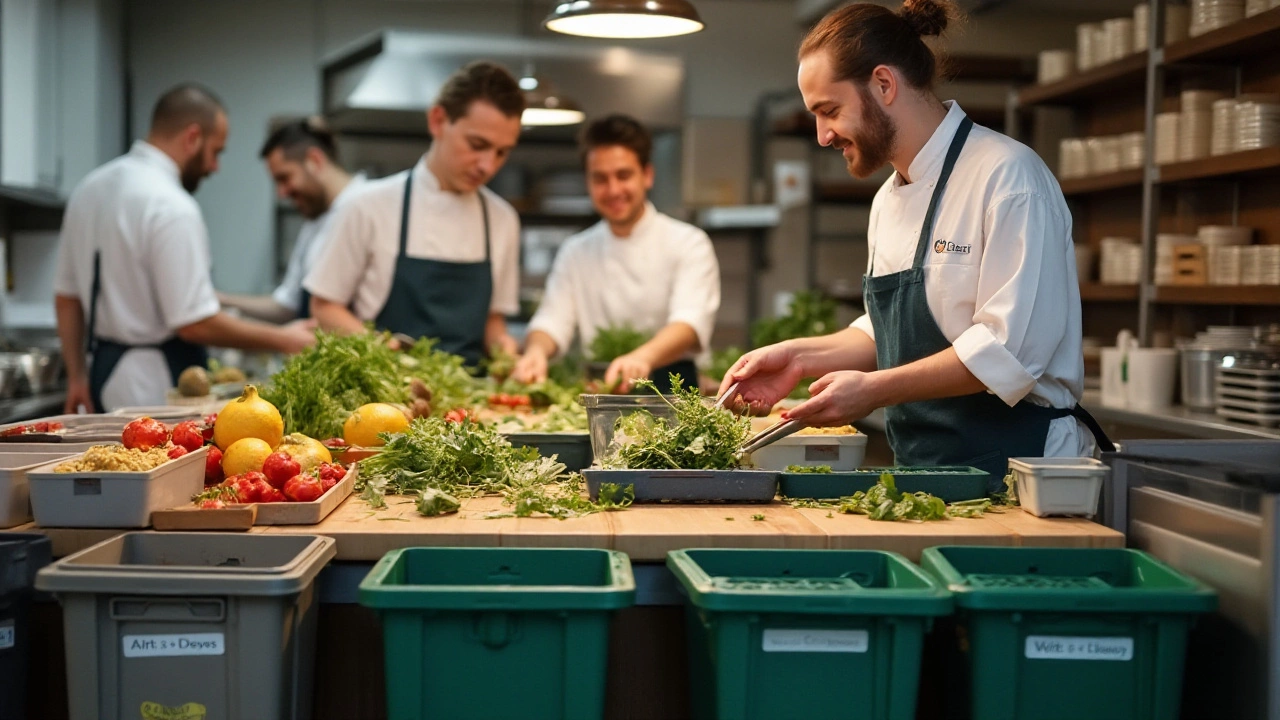What All-Inclusive Hotels Do with Leftover Food: Strategies and Solutions

In the endless buffets of all-inclusive hotels, the sight of sumptuous spreads is both enticing and overwhelming. But have you ever wondered what happens to the mounds of food that go uneaten? This conundrum is a significant one, intertwining hospitality operations with pressing sustainability concerns.
As these resorts work tirelessly to serve an array of guests, the challenge of managing leftover food becomes increasingly apparent. Yet, many establishments are stepping up, finding inventive ways to tackle this edible excess. From donating surplus to those in need, to composting biodegradable scraps, and crafting new dishes from previous night's fare, all-inclusive hotels are reshaping their waste narrative.
Join us as we delve into the myriad approaches these hospitality giants are adopting, both to reduce their environmental impact and to redefine the dining experiences for their guests.
- Understanding the Scale of the Issue
- Innovative Food Waste Strategies
- Donation Programs: Feeding Those in Need
- Composting and Environmental Benefits
- Creative Reuse: From Buffets to New Dishes
- The Role of Technology in Reducing Waste
Understanding the Scale of the Issue
All-inclusive hotels, known for their abundant and lavish buffets, attract guests with the promise of dining extravagance where plates can be filled to the brim without a second thought. This concept, while a delight to patrons, manages to create a significant challenge in terms of food management and sustainability. The sheer volume of food necessary to maintain such an offering means that a considerable amount is likely to be left unused and uneaten. This isn't just a minor issue but a global concern. A study conducted by the United Nations Environment Programme highlighted that roughly one-third of all food produced worldwide is wasted each year, which is around 1.3 billion tons. This staggering amount has raised alarms within the hospitality industry as well.
The logistical aspect of running a successful all-inclusive buffet is an operation that must balance supply and demand with razor-sharp precision. The unpredictability of guest preferences adds another layer of complexity, as does the high turnover of guest occupancy. Guests coming with varying dietary habits and appetites means that hotels need to prepare a diverse range of dishes, many of which might go untouched. A crucial thing to note is that it's not just about the cooked meals but the ingredients that expire, adding to the waste. In response, some hoteliers are innovating systems to track food consumption patterns to anticipate demand more accurately.
If we waste as much as we do, it calls into question the ethics of our systems,” says Dr. Jessica Lee, a sustainability expert. “Reducing food waste is not only an economic necessity but a moral one. Our planet cannot sustain this level of negligence.”
Moreover, the economic implications of food waste in all-inclusive hotels are vast. It's not only the cost of buying and preparing the food but also the expense of disposing of it. Landfills brim with discarded meals, contributing to methane emissions—a potent greenhouse gas. To mitigate these environmental impacts, some hotels partake in responsible waste initiatives, proving that creative collaborations and practices can lead to sustainable solutions. The complexity of the issue extends into cultural dimensions, too. While many guests enjoy the indulgence, a mindset shift towards appreciating resources can play a pivotal role in reducing waste.
Some hotels are stepping up by incorporating education into the guest experience, seeking to create a more conscientious traveler. Through information campaigns and partnerships with organizations dedicated to reducing food waste, these establishments demonstrate that tackling the problem requires a collective effort. By laying bare the realities behind the scenes, guests can become part of the solution, selecting carefully and valuing the bounty prepared for them. Such initiatives have increasingly shown positive outcomes, emphasizing the importance of each choice we make when it comes to what's left on our plates.
Innovative Food Waste Strategies
The challenge of managing leftover food in all-inclusive hotels has sparked a wave of innovation across the hospitality sector. To combat the surplus of uneaten dishes, many resorts are stepping beyond traditional methods, seeking creative solutions to address this pervasive issue. One such strategy is the implementation of on-site biogas plants. These facilities allow the hotels to convert organic waste into biogas, a renewable energy source that can power kitchens and other hotel operations. This not only reduces the food waste itself but also cuts down on energy costs, presenting a win-win scenario for financial and environmental commitments.
All-inclusive hotels are also investing in technologies like intelligent food inventory systems. These systems predict guests' dining preferences and adjust purchasing and preparation patterns accordingly, significantly reducing the likelihood of overproduction. Such smart systems analyze a plethora of data, including seasonal variations, occupancy levels, and even weather conditions to optimize food preparation processes. Many have reported a reduction in unnecessary waste by over 30% after adopting these technological advances, showcasing a direct benefit to both the business and the planet.
"By leveraging technology to streamline our food handling processes, we are making strides towards a more sustainable future," says a spokesperson from a leading resort chain.
Beyond technology, food waste management also involves fostering a culture of sustainability among staff and guests. Training staff to be mindful of portion sizes and waste can have a profound impact. Additionally, engaging guests in recycling initiatives or inviting them to participate in waste reduction challenges creates awareness and fosters a community effort towards sustainability. Some hotels have adopted 'zero-waste' cooking classes as part of the guest experience, teaching innovative ways to reinterpret leftovers into gourmet meals, thus aligning customer engagement with environmental responsibility.
Strategic partnerships also play a pivotal role. Collaborations with local farms and suppliers can help integrate a farm-to-table approach, where any surplus food is sent back to farms for animal feed, thus closing the loop and creating a symbiotic relationship with the local agriculture sector. This not only enhances food quality by focusing on seasonal and regional ingredients but also supports the local economy, blending sustainability with community benefits.
A growing trend is the establishment of food donation programs in collaboration with local charities and non-profits. While regulatory and logistical challenges exist, many resorts are navigating these hurdles to ensure that excess food reaches those who need it most, reinforcing a commitment to social responsibility. Not only do donation programs provide an avenue for reducing waste, but they also foster goodwill, enhancing the hotel's image and guest perceptions of their social values.

Donation Programs: Feeding Those in Need
When it comes to addressing the challenge of food waste in all-inclusive hotels, donation programs have emerged as a compassionate and effective solution. These programs involve the redistribution of excess food to those who need it most, turning potential waste into meals for the hungry. This approach not only helps alleviate food insecurity in nearby communities, but it also enhances the hotel’s commitment to social responsibility and sustainability.
Many all-inclusive hotels collaborate with local charities and non-profit organizations to efficiently move their surplus food into the hands of those who can benefit most. These partnerships are essential for the logistics of food donation, ensuring that excess meals are collected in a timely manner and transported under safe conditions. By working with local food banks and shelters, hotels can ensure that high-quality food reaches people in need, instead of ending up in landfill.
An inspiring example of this practice is seen with major hotel chains that have partnered with the Global FoodBanking Network. This organization helps connect surplus food from hotels with food banks around the world, giving the leftovers a second, meaningful life. By following food safety protocols and adhering to international guidelines, hotels can make significant contributions to reducing hunger and building stronger community ties.
"The ability to repurpose surplus food from hotels into nourishing meals opens new pathways for combating food insecurity while fostering sustainability," says a spokesperson from the Global FoodBanking Network.
Setting up a donation program does require effort and coordination, but the benefits are manifold. Firstly, hotels need to establish a system for identifying surplus items that are safe to donate. This typically involves training staff to categorize and handle food appropriately, minimizing risks of contamination. It's vital to maintain the quality and safety of the food, which necessitates investing in proper storage and transportation solutions to keep perishable items fresh until they reach their destination.
Food waste management through donation not only tackles hunger but also minimizes the environmental impact of uneaten food being discarded. Less organic waste in landfills means a reduction in methane emissions, a significant contributor to climate change. Additionally, these programs can enhance a hotel’s public image, aligning them with consumer values that increasingly prioritize ethics and ecologically-friendly practices.
Finally, successful donation initiatives often lead to rewarding relationships with the local community. For guests, staying at a hotel that actively engages in such programs can be a deciding factor in their booking choice. Knowing their stay contributes to a sustainable and charitable cause often enriches their travel experience, creating lasting positive impressions and a sense of participation in larger societal efforts.
Composting and Environmental Benefits
For many all-inclusive hotels, composting has emerged as a pivotal strategy in the war against food waste. This environmentally conscious approach involves the decomposition of organic material into a nutrient-rich soil amendment, which can significantly cut down on the volume of leftover food ending up in landfills. By transforming food scraps, hotels not only divert waste but also contribute to sustainable tourism practices. Composting helps enrich the soil, fosters the retention of moisture, and reduces the need for synthetic fertilizers. This natural recycling process closes the loop from farm to table to farm again, creating a harmoniously sustainable environment.
Take the example of large hotel chains that have implemented comprehensive composting programs. These programs usually start in the kitchen, where chefs and staff separate compostable waste. Specialized machines accelerate the breakdown process, producing compost in as little as 24 hours. The finished compost can then be used in landscaping projects within the hotel premises, allowing lush gardens to thrive. Some hotels even partner with local farms, providing them with quality compost in exchange for fresh produce, thus supporting local agriculture.
Integrating composting systems within hotels requires coordination and commitment. Training staff to adequately sort waste is crucial. Hotels must ensure that biodegradable scraps like fruit peels and coffee grounds are not mixed with non-compostable items. Educating guests about the importance of reducing food waste can also magnify the positive impact. When guests participate in composting efforts, they often leave feeling more invested in the environmental practices of the places they visit, enhancing their overall experience.
In terms of environmental benefits, the impact is significant. According to the Environmental Protection Agency, reducing food waste through composting can cut greenhouse gas emissions by preventing methane production in landfills. The benefits extend beyond reducing gases; improving soil health and plant growth creates carbon sinks that help in capturing CO2 from the atmosphere. This dual benefit of reducing emissions and enhancing soil quality showcases the powerful role composting can play in creating a healthier planet.
"Composting is not just a waste management tactic; it's an environmental stewardship practice," says Amelia Rowland, Director of Sustainability at Green Globe Certified Resorts. "The shift toward composting exemplifies how hospitality can embrace and promote sustainability at a fundamental level."
As the hospitality industry becomes increasingly eco-conscious, composting is rapidly becoming common practice. Guests are often delighted to learn that their favorite all-inclusive hotel is taking steps to preserve the environment. By prioritizing the transformation of all-inclusive hotel operations toward sustainable ends, hoteliers can create a lasting legacy of ecological responsibility, ensuring that guests can enjoy both the lavish amenities of today and a cleaner, greener world tomorrow.

Creative Reuse: From Buffets to New Dishes
When excess food becomes a spectacle at all-inclusive hotels, clever chefs step in, transforming yesterday's buffet treasures into today's gourmet surprises. This form of culinary innovation is more than just an art—it's an essential practice in reducing food waste and embracing sustainable tourism. The mantra is simple: nothing should go to waste if it can be honored with a new lease on life. Delving into this practice, many hotels are turning leftover ingredients into vibrant dishes that reflect creativity and resourcefulness.
Chefs at these resorts often find inspiration from cultures that have long mastered the art of reusing food. Take, for instance, the Spanish 'Croquetas', an ingenious concoction where bits of meat or mushrooms from last night morph into creamy, breadcrumb-coated delicacies. Similarly, Indian cuisine’s spicy 'Koftas' often begin as remnants of the previous day, seasoned anew to create something profoundly different. By employing such traditional techniques, chefs not only save leftover food from landfill but also enrich their menu with diverse global flavors.
A paradigm shift among chefs has also seen the introduction of ‘Chef’s Specials’ in hotel dining, where the emphasis is placed on using available excess. Not only does it keep the menus exciting, but it also gives guests a chance to partake in this sustainable effort, knowing they’re consuming dishes created with mindfulness. Some guests, undoubtedly the food enthusiasts among them, see this transparency as an added layer to their dining experience, allowing them to indulge while supporting environmentally conscious practices.
Often, all-inclusive hotels encourage guests to partake in cooking classes led by their head chef. These sessions offer not just a taste of the local cuisine but insight into how seemingly mundane leftovers can be transformed. Whether it's learning how to whip up a refreshing gazpacho using surplus tomatoes and peppers or crafting pâtés from excess pâtisserie ingredients, these workshops champion the philosophy that sustainability doesn't mean compromising on taste or enjoyment.
Beyond ad-hoc creativity, technology plays a vital role in ensuring that surplus food finds a worthy cause. For instance, real-time inventory management systems can help chefs predict excess, allowing them to adjust meals accordingly. This proactive approach significantly cuts down on unnecessary surplus. As the culinary world leans into this innovative realm, it's comforting to know that deeply-rooted traditions of food conservation are now supported by digital advancements.
A quote from prominent sustainability chef, Massimo Bottura, resonates with this movement, as he once said, “Cooking is a call to act... it starts with bread that’s leftover and turns it into something beautiful”. Such sentiments echo across the hospitality world, urging other chefs and establishments to follow suit. This blending of artistry and necessity opens a new chapter in hospitality, one where leftover food becomes a valuable asset, not a disposable burden.
The Role of Technology in Reducing Waste
As the hospitality industry grapples with the ever-growing challenge of reducing food waste, technology emerges as a crucial ally. In all-inclusive hotels, where guests are used to lavish buffets and round-the-clock dining, utilizing technology effectively can make a significant difference. Many hotels today are turning to innovative solutions to tackle the complex problem of leftovers, transforming what was once seen as inevitable waste into opportunities for sustainability and efficiency.
One of the standout advancements is the use of waste tracking software. These systems allow chefs and kitchen staff to monitor the quantity and type of food that ends up in the bin, providing critical data that can be used to adjust the menu, portion sizes, and meal preparation techniques. By understanding which dishes frequently remain untouched or are overproduced, these establishments can tailor their offerings to guests' preferences more accurately, resulting in less waste. Some software even integrates predictive analytics, helping kitchens forecast demand with remarkable precision, and ensuring that resources are used wisely.
Another key area where technology is making strides is in the donation of leftover food to those in need. Platforms and apps have been developed to connect all-inclusive hotels with local charities and food banks quickly and efficiently. This not only supports the community but also reinforces a hotel's commitment to social responsibility. By logging surplus food items into these networks, resorts can dispatch ready-to-eat meals to aid organizations, contributing to both sustainability efforts and humanitarian causes.
In the dining halls, smart kitchen appliances and IoT (Internet of Things) devices are being employed to optimize ingredients' longevity. Refrigeration systems can automatically adjust their temperatures based on the stored food, ensuring that perishables last longer. Additionally, digital kiosks and menus that update in real-time allow guests to see exactly what's available, simultaneously aiding in reducing waste by encouraging more informed choices. An interesting case is that of a resort in Mallorca, which saw a 30% reduction in food waste after implementing real-time menu displays and personalized dining suggestions based on previous consumption patterns of its guests.
Perhaps most intriguingly, technology is also paving the way for innovative food processing methods that turn the inevitable scraps into useful products. Machines equipped to dehydrate and grind organic waste into compostable materials are becoming fixtures in many hotel kitchens. This not only minimizes what goes to landfill but also provides rich fertilizer that can be used in hotel gardens, creating a closed-loop system that emphasizes sustainability. In some forward-thinking establishments, these technologies even allow for the conversion of food waste into bioenergy, powering parts of their operations and reducing their carbon footprint significantly. As the saying goes, "Today's innovation lays the foundation for tomorrow's transformation." Technology is indeed transforming how hotels manage food waste, turning it into a resource rather than a liability.
Incorporating these technological advancements not only helps reduce waste but also adheres to evolving guest expectations. Travelers today are increasingly eco-conscious, often choosing hotels based on their environmental practices. By showing a commitment to sustainable food waste management, all-inclusive hotels not only do their part for the planet but also strengthen their market positioning. As guests continue to prize sustainability as a core value of their travel experience, technology-based solutions will likely become not just beneficial but essential for those in the hospitality industry.